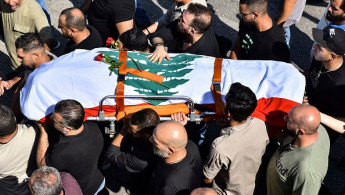Lebanon submits complaint to UN over Israeli killing of journalist
Lebanon’s mission to the UN will submit a complaint to the UN Security Council over Israel’s "deliberate" killing of a Lebanese journalist and wounding of several other journalists in a missile strike on Friday.
Israel targeted a group of journalists reporting on the fighting between it and Hezbollah on the Lebanese-Israeli border, killing 37-year old Reuters journalist Issam Abdullah and injuring others from Agence France Press and Al Jazeera.
At least one of the wounded journalists was seriously injured and is undergoing surgery for her injuries.
The Israeli strike came as six days of rocket exchanges between it and Hezbollah intensify, leaving at least 7 militants dead on the Lebanese side and one dead and other critically injured on the Israeli side.
The Lebanese Foreign Ministry said on Saturday that the targeting of journalists constituted a "crime against freedom of opinion and the press … and international humanitarian law."
In a statement to The New Arab, a spokesperson for the Israeli Army said that it "does not target journalists," and that there was an investigation underway to determine how the journalists were targeted.
The spokesperson further added that the area journalists where the journalists were located saw "anti-tank missiles" fired from it.
The Israeli statement was contrary to the account of three witnesses who were on the scene and two Lebanese security officials which TNA spoke with.
"We were clearly marked and there was a group of us, far from the fighting. We didn’t hear or see anything come from the Lebanese side behind us," Ali Rabah, a reporter with TNA's Arabic-language sister channel Al-Araby TV who was present during the Israeli airstrike, told TNA.
Footage taken by journalists show a group of journalists, all wearing protective jackets with the word PRESS written on it, standing on a hill-side taking footage of the Israel-Lebanese border.
Both Rabah and Charbel Francis – an Al-Araby TV cameraman – said they saw Israeli helicopters flying "directly overhead" them as they reported prior to the missile strike.
A third journalist, injured in the strike, said that they were far from the clashes they were filming.
A high-ranking security official told TNA that the journalists were located about a kilometre to a kilometre and a half from the fighting.
Footage captured the sound of an explosion and a journalist screaming, "What happened? I cannot feel my legs!" repeatedly.
Reporters Without Borders (RSF) said that it condemned the "heinous crime against journalists and is continuing its investigations into the circumstances of this tragedy."
Al Jazeera said in a statement that it holds Israel "responsible for this brutal attack and calls on the international community to take action to ensure the safety of other journalists."
According to RSF, at least seven journalists – in Gaza and Lebanon – have been killed in seven days "as a result of Israel’s indiscriminate response to the horrific massacre committed by Hamas."
Under international law, attacks intentionally targeting journalists constitutes a war crime.
On Saturday, hundreds gathered to commemorate the memory of Abdallah in his hometown of Kheim, in southern Lebanon. Fellow journalists, politicians and friends came to pay their respects as his body was laid to rest.




 Follow the Middle East's top stories in English at The New Arab on Google News
Follow the Middle East's top stories in English at The New Arab on Google News


